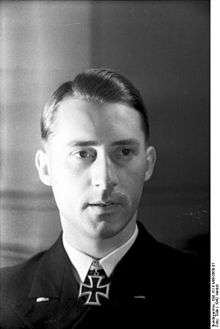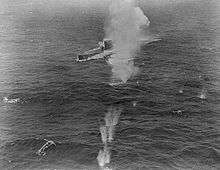Heinz-Otto Schultze
| Heinz-Otto Schultze | |
|---|---|
 Heinz-Otto Schultze | |
| Born |
13 September 1915 Kiel |
| Died |
25 November 1943 (aged 28) South Atlantic 06°30′S 05°40′W / 6.500°S 5.667°W |
| Allegiance |
|
| Service/branch |
|
| Years of service | 1934–43 |
| Rank | Kapitänleutnant |
| Unit |
SSS Gorch Fock light cruiser Karlsruhe Schleswig-Holstein U-31 |
| Commands held |
U-4 U-141 U-432 German submarine U-849 |
| Battles/wars | World War II † |
| Awards | Knight's Cross of the Iron Cross |
| Relations | Otto Schultze (father) |
Heinz-Otto Schultze (13 September 1915 in Kiel – 25 November 1943 in the South Atlantic) was a German U-boat commander in World War II and recipient of the Knight's Cross of the Iron Cross (Ritterkreuz des Eisernen Kreuzes). The Knight's Cross of the Iron Cross was awarded to recognise extreme battlefield bravery or successful military leadership. He is credited with the sinking of 20 ships for a total of 67,991 gross register tons (GRT) plus damaging a further two ships for a total of 15,666 GRT.
Naval career
Heinz-Otto Schultze was the son of Otto Schultze, commander of U-63 during World War I and a recipient of the coveted Pour le Mérite and later Generaladmiral of the Kriegsmarine.[1]
Schultze joined the Reichsmarine on 8 April 1934 as a member of Crew 1934 (the incoming class of 1934) where he received his basic military infantry training with the II. Schiff-Stamm-Abteilung der Ostsee (2nd department of the standing ship division) of the Baltic Sea in Stralsund.[Notes 1] He was transferred to the school ship SSS Gorch Fock on 15 June 1934 for his on board training. Here he was promoted to Seekadett (Midshipman) on 26 September 1934. He then was transferred to the light cruiser Karlsruhe on 27 September 1934.[2]

He transferred to the U boat service on 19 May 1937 and completed the U boat school. Schultze was first posted on board of U-31 on 30 March 1938, initially serving as a second watch officer. He was made first watch officer on board of U-31 on 6 November 1938 and promoted to Oberleutnant zur See (Sub-Lieutenant) on 1 April 1939. He received command of his first U boat, U-4, a school U boat, on 8 June 1940.[3]
Schultze was ordered to the Schichau-Werke, a shipyard in Danzig (now: Gdańsk, Poland), for construction familiarization of U-432. He commissioned U-432 on 26 April 1941. His first war patrol as a commander, his fifth of the war, lasted from 30 July until 19 September 1941 and resulted in the sinking of four ships totalling 10,774 GRT. Schultze surrendered command of U-432 on 16 January 1943 taking command of U-849 on 11 March 1943. His fifth patrol as a commander of U-432 targeted the East Coast of the United States of America. U-432 left La Pallice on 21 January 1942 and returned to La Pallice on 16 March 1942. During this patrol Schultze torpedoed and sank five ships for 25,107 GRT. After his return, Schultze was heavily criticized by the Befehlshaber der U-Boote (BdU) for the sinking of a Brazilian ship without warning. This attack was conducted against standing orders.[3]
U-849 left Kiel on its first war patrol on 2 October 1943 and was sunk by depth charges from a US B-24 Liberator B-6 from Navy-Squadron VB-107 on 25 November that year in the South Atlantic west of the Congo estuary, in position 06°30′S 05°40′W / 6.500°S 5.667°W. Schultze and the entire crew of U-849 were killed in the sinking. This was Schultze's 12th patrol of the war.[4]
Summary of career
Ships attacked
| Date | Name | Nationality | Tonnage (GRT) |
Fate[5] |
|---|---|---|---|---|
| 10 September 1941 | Muneric | 5,229 | Sunk | |
| 10 September 1941 | Stargard | 1,113 | Sunk | |
| 10 September 1941 | Winterswijk | 3,205 | Sunk | |
| 11 September 1941 | Garm | 1,231 | Sunk | |
| 17 October 1941 | Barfonn | 9,739 | Sunk | |
| 17 October 1941 | Bold Venture | 3,222 | Sunk | |
| 17 October 1941 | Evros | 5,283 | Sunk | |
| 28 October 1941 | Ulea | 1,574 | Sunk | |
| 15 February 1942 | Buarque | 5,172 | Sunk | |
| 18 February 1942 | Olinda | 4,053 | Sunk | |
| 19 February 1942 | Miraflores | 2,158 | Sunk | |
| 21 February 1942 | Azalea City | 5,529 | Sunk | |
| 27 February 1942 | Marore | 8,215 | Sunk | |
| 17 May 1942 | Foam | 324 | Sunk | |
| 23 May 1942 | Zurichmoor | 4,455 | Sunk | |
| 31 May 1942 | Liverpool Packet | 1,188 | Sunk | |
| 3 June 1942 | Aeolus | 41 | Sunk | |
| 3 June 1942 | Ben and Josephine | 102 | Sunk | |
| 9 June 1942 | Kronprinsen | 7,073 | Damaged | |
| 9 June 1942 | Malayan Prince | 8,593 | Damaged | |
| 24 September 1942 | Pennmar | 5,868 | Sunk | |
| 17 December 1942 | Poitou | 310 | Sunk |
Awards
- Dienstauszeichnung 4th Class (1 September 1939)[6]
- Sudetenland Medal (16 September 1939)[6]
- Iron Cross (1939)
- U-boat War Badge (1939) (13 September 1939)[6]
- Knight's Cross of the Iron Cross on 9 July 1942 as Kapitänleutnant and commander of U-432[7]
Notes
- ↑ The German Reichsmarine was renamed to Kriegsmarine on 1 June 1935.
References
Citations
Bibliography
- Busch, Rainer; Röll, Hans-Joachim (2003). Der U-Boot-Krieg 1939–1945 — Die Ritterkreuzträger der U-Boot-Waffe von September 1939 bis Mai 1945 [The U-Boat War 1939–1945 — The Knight's Cross Bearers of the U-Boat Force from September 1939 to May 1945] (in German). Hamburg, Berlin, Bonn Germany: Verlag E.S. Mittler & Sohn. ISBN 978-3-8132-0515-2.
- Fellgiebel, Walther-Peer (2000). Die Träger des Ritterkreuzes des Eisernen Kreuzes 1939–1945 — Die Inhaber der höchsten Auszeichnung des Zweiten Weltkrieges aller Wehrmachtteile [The Bearers of the Knight's Cross of the Iron Cross 1939–1945 — The Owners of the Highest Award of the Second World War of all Wehrmacht Branches] (in German). Friedberg, Germany: Podzun-Pallas. ISBN 978-3-7909-0284-6.
- Huß, Jürgen; Viohl, Armin (2003). Die Ritterkreuzträger des Eisernen Kreuzes der preußischen Provinz Schleswig-Holstein und der Freien und Hansestadt Lübeck 1939–1945 [The Knight's Cross of the Iron Cross Bearers of the Prussian Province of Schleswig-Holstein and the Free and Hanseatic City of Lübeck 1939–1945] (in German). Zweibrücken, Germany: VDM Heinz Nickel. ISBN 978-3-925480-79-9.
- Scherzer, Veit (2007). Die Ritterkreuzträger 1939–1945 Die Inhaber des Ritterkreuzes des Eisernen Kreuzes 1939 von Heer, Luftwaffe, Kriegsmarine, Waffen-SS, Volkssturm sowie mit Deutschland verbündeter Streitkräfte nach den Unterlagen des Bundesarchives [The Knight's Cross Bearers 1939–1945 The Holders of the Knight's Cross of the Iron Cross 1939 by Army, Air Force, Navy, Waffen-SS, Volkssturm and Allied Forces with Germany According to the Documents of the Federal Archives] (in German). Jena, Germany: Scherzers Militaer-Verlag. ISBN 978-3-938845-17-2.
External links
- Helgason, Guðmundur. "Heinz-Otto Schultze". German U-boats of WWII - uboat.net. Retrieved 6 April 2011.
| Military offices | ||
|---|---|---|
| Preceded by Kapitänleutnant Hans-Peter Hinsch |
Commanding officer, U-4 8 June 1940 – 28 July 1940 |
Succeeded by Kapitänleutnant Hans-Jürgen Zetzsche |
| First | Commanding officer, U-141 21 August 1940 – 30 March 1941 |
Succeeded by Kapitänleutnant Philip Schüler |
| First | Commanding officer, U-432 26 April 1941 – 15 January 1943 |
Succeeded by Kapitänleutnant Hermann Eckhardt |
| First | Commanding officer, U-849 11 March 1943 – 25 November 1941 |
Ship sunk |